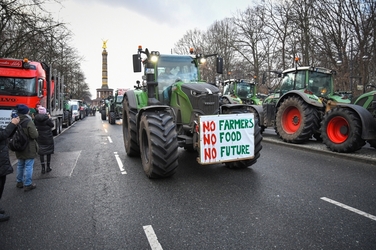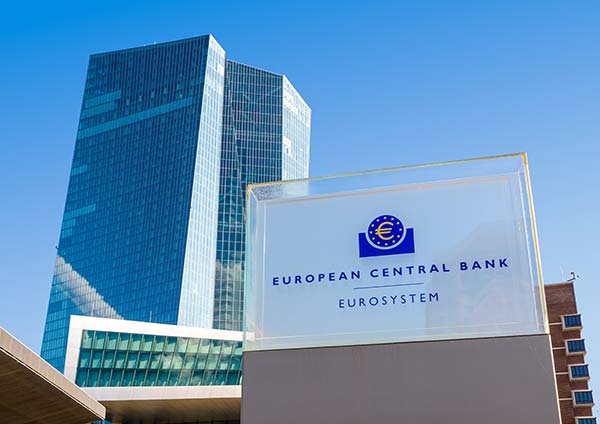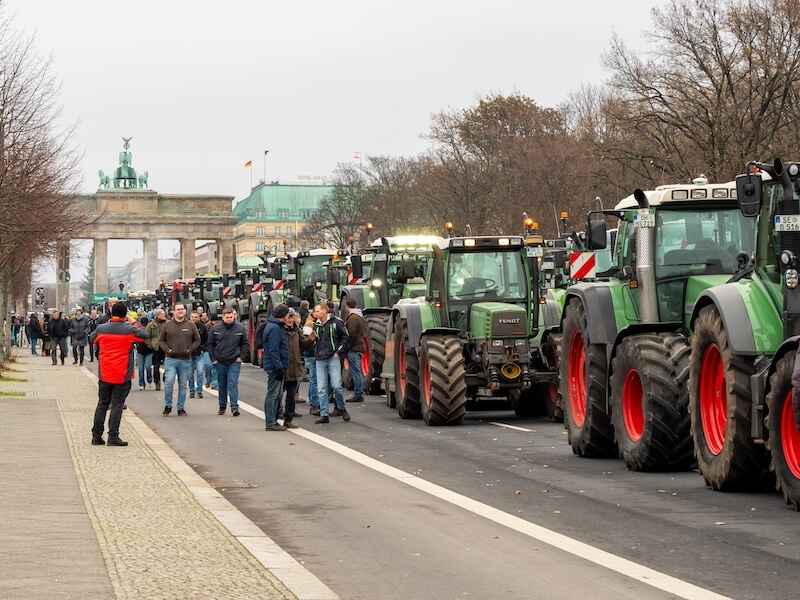A Perfect Storm of Government Misdeeds
Joel Salatin|March 2, 2024

Having done many farmer seminars in Europe, I’d like to share my perspective on the farmer uprisings there.
Many issues are converging to cause this unrest… and both sides are to blame. Anyone who reacts with a one-sided “poor farmers” sigh does not appreciate mainline agriculture in Europe.
First, let’s look at why this started in the Netherlands.
The answer is simple… That’s where farming’s ecological abuses are most apparent and critical.
Not only is the Netherlands at or below sea level, it is essentially a massive delta and wetland through which more than half of Europe’s rivers drain.
When these fields were first drained for cropland, they contained massive amounts of legacy biomass. This provided a sponge for water and a base to hold up the ground.
Tilling the land injected oxygen into the soil, which began oxidizing this spongey base. That caused sinkage. As these fields sunk, they became waterlogged. In the Netherlands, a foot of height difference in a field is the difference between being usable and not being usable.
Thousands of acres are going through this problem.
Reckless Spending
Meanwhile, the European Union gives $60 billion a year in direct subsidy payments to farmers. Netherland farmers, for example, receive $1,000 an acre per year just for owning farmland.
This skews not only the value of farmland, but the economics of farming. Small farms, with these kinds of subsidies, can overbuy big equipment and overbuild infrastructure.
As a result, farmers don’t have to watch their pennies. They can spend with reckless abandon, like building expensive barns for livestock.
Leveraging heritage relationships from when the Dutch ruled the seas, these farmers enjoy bottom-rate feed grain contracts with Uruguay, Brazil, Argentina and Paraguay.
Massive grain imports coupled with overbuilt livestock housing means the farmers are not tied to ecological carrying capacity. I’ve met dairy farms with 100 cows on 10 acres. That’s about 220,000 pounds of manure and urine per acre. An acre can only handle about 50,000 pounds per year.
Where does the excess go?
Into the canals, creating four times the nitrogen load compared to any other European country. Rural areas smell like a toilet.
The nutrient-clogged canals grow copious amounts of biomass like willows and other hydrologic plants, trying to use up the excess nutrients. That growth leads to high municipal clean-out and dredging costs.
When you add up the farmers’ impact… you have odors, sinking landscapes and costly canal maintenance.
I think you get the picture. When I’ve done seminars about how to farm differently in these areas, the many farmers who attend all know European farming is not taking care of the environment. Neither is American farming, but the average consumer in our country is more oblivious.
European consumers are far more aware of what’s going on. Europe has a food culture, and it’s not McDonald’s. Big difference.
Now let’s look at the other side…
A Perfect Storm
Government bean counters and politicians, who have overspent (like farmers), overinvested in green energy, and underinvested in defense, are now facing a perfect storm trying to find money.
With cheap Russian energy and fertilizer blocked, basic costs have skyrocketed. And now they’re trying to figure out how to send billions of dollars of military aid to Ukraine.
The financial strain is enormous.
Who is the easiest to cut off the government paycheck?
Farmers.
Since they represent the tiniest voting block with an inordinate amount of cost, farmers offer the quickest budgetary balance opportunity. But the farmer dependence created by these government officials since WWII is catastrophic to roll back too quickly. The shock to the system is now being manifested in these protests.
The bottom line is that the EU created a farmer dependency class and now wants to catastrophically wean the system from government largesse. Justifications are economics (primarily to arm Ukraine), climate change (livestock burps) and environmental degradation (chemicals).
Farmers aren’t stupid. They understand they’re being targeted or at least blamed inappropriately. Since 2005, one-third of EU farmers have gone out of business, many by retiring.
The older a person gets, the more resistant to change he becomes. Innovation inherently involves lots of failure to get the idea right. Older people don’t have the tolerance mentally or physically to abide the cost of failure.
If all these farmers were in their 20s, they would be much more amenable to proposed changes. But the aging farmer reality exacerbates the opposition.
No Respect
Much of the frustration and furious response comes from a general feeling among farmers that they are disrespected and dishonored. That includes being generally excluded from high level governmental discussions regarding proposed policy changes. Because farmers are such a tiny voting bloc, they routinely get overlooked at the table.
Not having a voice is worse than losing a spirited debate.
This is why the protests enjoy such broad support from the working class. And it is why as a social and cultural movement, these protests are not primarily about farming, but about peasants being overrun by lords in Brussels.
At its heart, this is a movement pitting the working class against the elites. Vocational people, best represented philosophically by farmers, are tired of being jerked around by powerful interests who view most people like pawns on a chess board.
Make no mistake… this European phenomenon is not primarily about farmers. It is about perceived unfairness between commoners and elites.
Since WWII, farmers have been told to produce more, even to destroy ecology. They’ve been subjected to policy whims that subsidize them on one hand while giving concessionary cheap import opportunities on the other hand.
The intrusive, micro-management manipulative hand of the EU on everything from Polish sausage to wooden chicken shelters stifles entrepreneurism and free market adjustments.
Farmers could have and would have adjusted to markets and consumer interests gently over the past few decades. Instead, government policy incentivized a perverse continuation of unwanted, unmerited, unrealistic agricultural protocols.
Inevitable
This is the inevitable outcome of top-down market regulation and intervention. It never corrects gently. It only corrects with a catastrophic heavy hand.
In the U.S., the intervention has come primarily through food police, licenses, and food safety requirements rather than direct subsidies. And the federal government intervention is a more subtle manipulation, like funding research and giving tax concessions for things like ethanol plants.
But like all government interventions in the marketplace, these involvements reduce personal responsibility and accountability to new information. It sets a course of action that’s harder to bend when the path becomes obsolete or inappropriate.
The result is unnecessary tension. As global elitists tighten the noose around free enterprise and working class opportunity, this kind of struggle will gain momentum.
The best way forward is to develop an exit strategy for government manipulation. Not a jump off the cliff, but a systematic, reasonable divorce from top-down everything.
A bottom-up context creates the opportunity for gentle course correction, over time, as individuals learn more information and metabolize it into the marketplace.
And if American leaders are smart, they’ll realize how a similar backlash of the working class will question policy and sow distrust.
Currently, all polls indicate an unprecedented mistrust of major American institutions.
European farmers’ mistrust index has been high for more than a decade. Now it’s spilling over. Everyone can share in the blame. Untangling the situation isn’t easy.
The important thing to realize is that it’s not black and white, one side good and the other bad. It can be solved sensibly.
America’s pot is simmering as well. The sooner we push the federal government out of the food and farm sphere, the sooner balance can be restored here.

Joel Salatin
Joel Salatin calls himself a Christian libertarian environmentalist capitalist lunatic farmer. Others who like him call him the most famous farmer in the world, the high priest of the pasture, and the most eclectic thinker from Virginia since Thomas Jefferson. Those who don’t like him call him a bioterrorist, Typhoid Mary, a charlatan, and a starvation advocate. With a room full of debate trophies from high school and college days, 12 published books, and a thriving multigenerational family farm, he draws on a lifetime of food, farming and fantasy to entertain and inspire audiences around the world.





